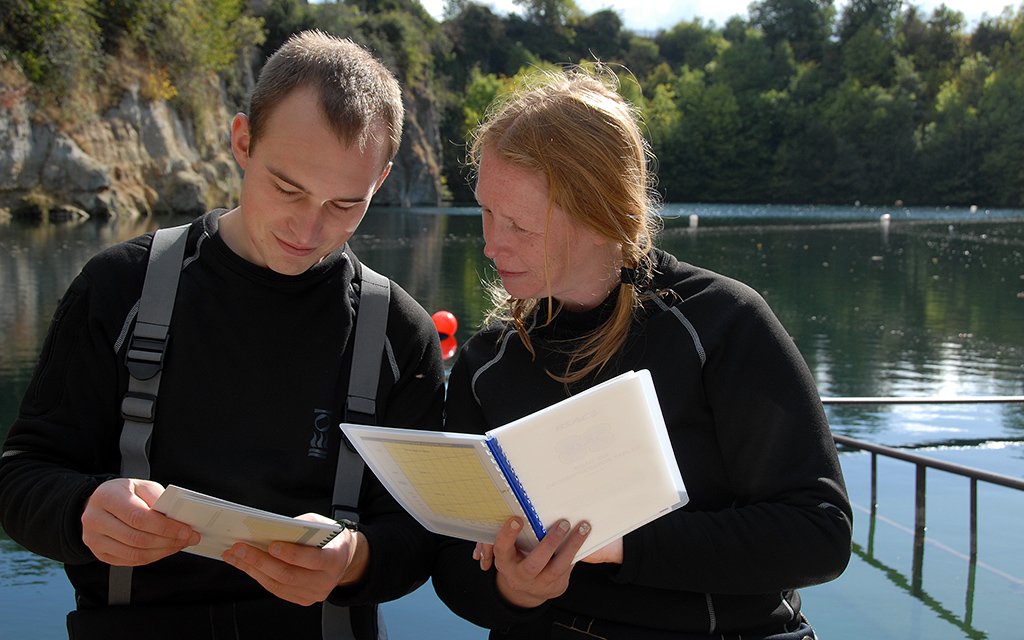
If you’re looking for the next diving challenge to inspire you to do new and different things, then working towards BSAC’s top personal diving qualification First Class Diver is a great opportunity, says Louise Whitehouse, National Instructor and First Class Diver.
It’s a challenging qualification and that’s the reason to do it. Whether you're an Advanced Diver wondering what to do next, or you enjoy pushing yourself and want to extend your experience and knowledge of diving, then get started. The journey towards it will teach you a lot and you’ll undoubtedly enjoy it.
When I started my preparation, I’d done some diving with friends who were prepping and seen how much enjoyment they’d got out of adding that new dimension. Seeing them working to be more self-sufficient, properly planning all their diving and thinking about trying to instil a purpose into dives, I saw that there could be a whole new level to the diving that I was doing. I also saw the stress they put themselves under and how challenging the process was at times – but I decided to ignore that and embrace self-development.
1. Find out what it’s all about
The first thing to do is to register your interest with the BSAC First Class Diver Chief Examiner via the BSAC website. Registering doesn’t commit you to anything, but it allows you to get a feel for where you’re at and link up with other people working towards First Class Diver in your area.
To enrol in First Class Diver training you must have successfully completed an Advanced Diver course and have logged 100 dives in a range of conditions since qualifying. At least 20 of these must show experience of diving to depths greater than 30m. You also need to have completed the following Skill Development Courses:
- Chartwork and Position Fixing
- Diver Coxswain Assessment
- Oxygen Administration
- Practical Rescue Management
- Advanced Lifesaver Award
- First Aid for Divers
Some of these you will have done on your journey to Advanced Diver, others you might not even have thought about, but each will help build up the toolkit of skills and experience that you will need.
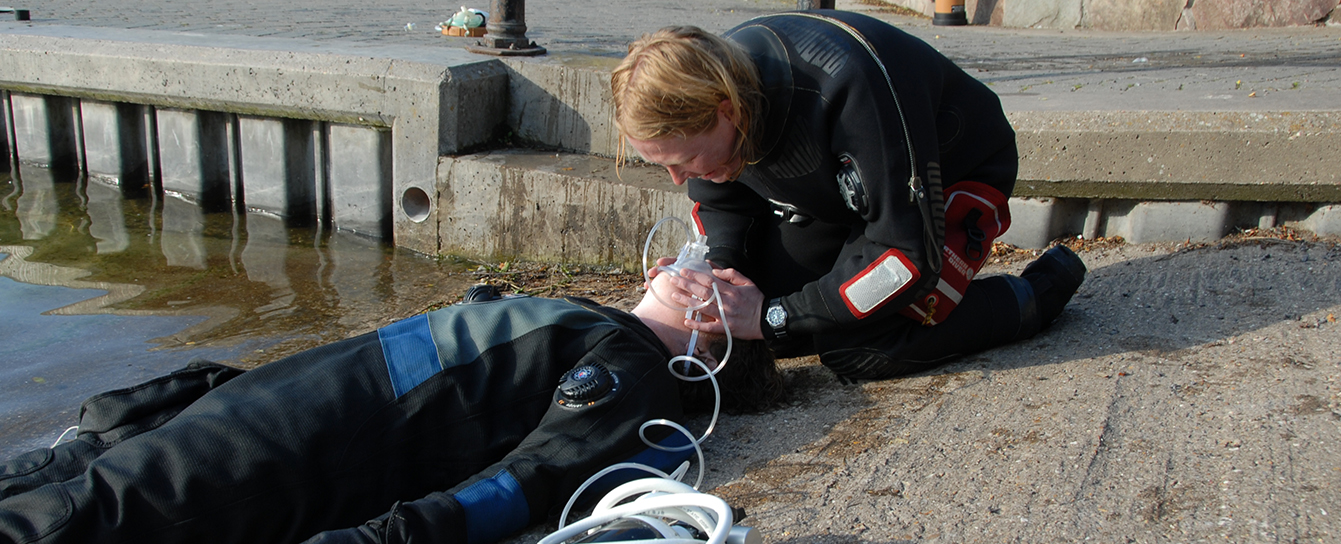
Oxygen Administration is an essential SDC for First Class Divers
Learn more about the O2 Admin course and book on courses in your area at bsac.com/O2
2. Understand the process
First Class Diver involves three assessments; each is taken separately and at your own pace.
Theory assessment – This is a good place to start work. Your theory knowledge needs to be thorough, so spend time (usually in the long, dark, cold winter evenings) getting up to date.
Expedition plan – You need to prepare a complete written plan for a diving expedition, not just a simple trip or club outing. So either the location needs to have challenges or there needs to be a purpose to the diving, or even better – both. Maybe choose somewhere that you have always wanted to dive, and then when you get there you can eventually dive your plan.
Practical exam – This two-day assessment tests your abilities to dive and manage at First Class Diver level. There are twelve assessment areas including teamwork and leadership.
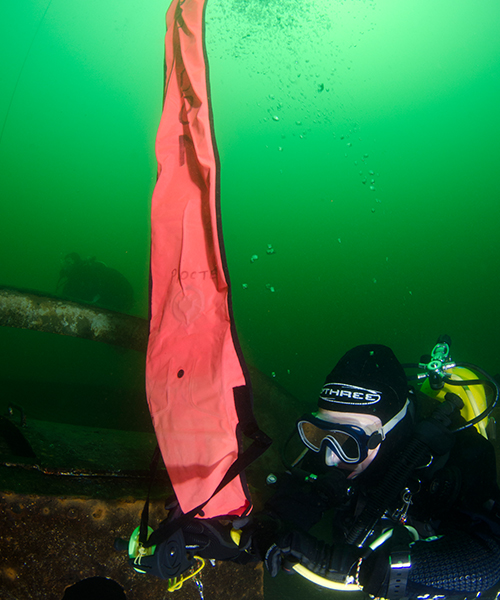
3. Do a skills audit
Once you’ve decided to take the challenge on, you need to map out your route. For each section of the three assessments think where you are now, where you need to be and what you need to do to get there. Remember that this is a diving qualification so think about diving skills across the board.
Are you confident with boat handling: deploying and picking up divers? If not, find opportunities to practice, if your branch doesn’t have a boat, can you hook up with another branch or find a regional event?
Do you understand charts and how to use them for planning diving? If not, get involved in planning an expedition or assist on a Chartwork and Position Fixing course.
Are you happy planning and executing task-based diving? If not, look at Search and Recovery courses, or for a different approach contact the Nautical Archaeology Society to find out about its training courses. Encourage your branch to take on a project. Adopt a wreck and survey it or try to find some new local sites to enjoy.
Are you confident identifying marine life? If not, do the Marine Life Appreciation SDC or get involved in Seasearch diving. Make the effort on all your dives to look carefully at the marine life you see, make note, sketches and take photographs to help build up your library of knowledge.
Can you plan and lead a challenging dive at the level of a First Class Diver, including navigating, identifying points of interest for your buddy and helping them to get the most out of the dive? If not, take the lead in all your dives, especially the more challenging ones. Make the effort to research and plan dives in advance, think about how you can actively lead the dive.
Can you lead a team and the planning of a dive expedition, and can you work as a supportive team member? If not, get involved in planning and leading branch activities, and find other divers to work with who are also looking to extend and share their experiences. Plan and execute some expedition diving.
4. Get reading
By the time you reach the point of thinking about First Class Diver there are undoubtedly some areas of diving theory that you’re very comfortable with, for example, if you regularly dive on mixed gases then you’ll be familiar with the science behind them and the decompression approaches, however you may not have a thorough understanding of rebreathers and their construction.
The First Class Diver written assessment covers a broad range of topics in reasonable detail, you’ll be expected to recall facts, interpret information and provide your thoughts on how (for example) a project might be tackled. Then on the practical exam, you’ll be expected to demonstrate your understanding of diving theory throughout the assessment. This will generally be linked to something that’s going on at the time, perhaps clarifying what you expect the weather to do and how that will impact on the day or explaining the rationale behind your decompression strategy.
You need to have a good knowledge across the diving spectrum, but in particular, make sure you understand why you have made the choices you have. Why did you choose the set-up you dive with? Why are you deploying the shot in that way? What action would you expect the surface cover to take if you deployed the yellow delayed surface marker buoy that you have in your pocket – and was it covered in the Dive Manager’s brief?
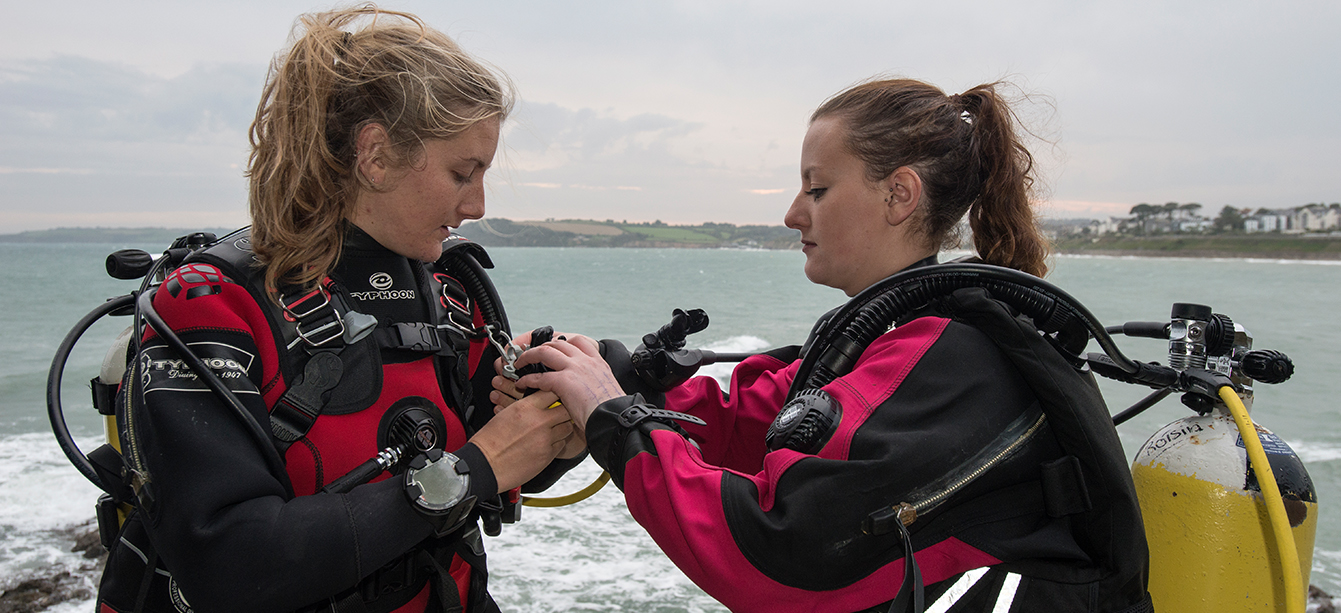
Working as part of a team is vital to success in the First Class Diver practical exam, but it is also essential to have your own personal plan.
5. Form a team
Working with other people prepping for First Class Diver is a great way of getting feedback, sharing expertise and forming a group to work with on the practical exam. By working together, you start at an advantage when it comes to performing on the exam, you know each other’s strengths and how you best work together which can be a massive confidence boost.
On the other hand, you need to take great care not to exclude others from your team when it comes to the exam. Let them in and value what they can bring to the table. Good teamwork can make everything easier. This isn’t a competition, everyone can pass, so you need to work together to make sure that everyone can shine.
6. Plan your personal strategy
Although working as part of a team is vital to success in the First Class Diver practical exam, it is also essential to have your own personal plan. There are twelve elements to the exam and to pass you need to demonstrate to the examiners that you meet the criteria for each element. This is something that I personally found difficult. In the real world, I am good at organising events and people; I plan, arrange, and get people doing. Things happen, everyone is happy and they know it was me that made things happen.
In First Class Diver exam world, there are multiple people trying to demonstrate how great they are, you take it in turns to be in charge and it isn’t always immediately obvious to the examiners who should be getting the credit. These issues are compounded when some people always give the impression of being in charge, while others lead in a less conspicuous manner. For me, this meant that I didn’t necessarily get the credit for the things I did do and it was also very easy for me to be pushed out of the limelight by other noisier characters.
As a candidate you need to play the game to a certain extent; if you’re doing something that demonstrates dive leadership then wave it under the nose of the nearest examiner. Make it easy for them to remember the evidence that they need in each area when it comes to writing up their comments. However unlike your usual style of dive management this is, remember that this is an exam situation and there is a certain amount of game-playing to be done to ensure that you show off all your skills and don’t have to try again.
I passed the practical exam on the third attempt and having just re-read the examiners’ comments on my performance, the main issues for me were confidence-related. In part that can be dealt with by having a strategy for how you are going to work and show how good you are.
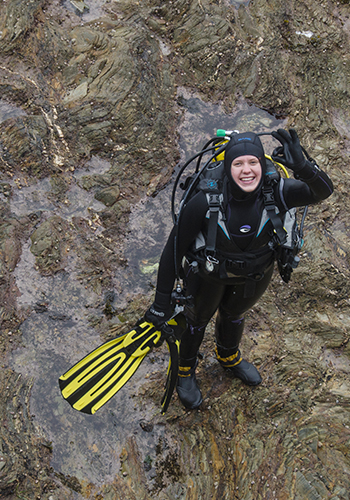
7. Understand dive leadership
Think about the difference between leading a dive for an Ocean Diver and leading a dive at 35m on a wreck when your buddy is another Advanced Diver (or higher). In the second case, if you try to hold their hand and lead them around a wreck they aren’t going to enjoy the dive, but if you take the lead by ensuring you both stick to the plan and get the most out of the dive then you’ll both have a positive experience. Leading experienced divers is about making the most of your skills and knowledge and sharing it with your buddy. Although you’re leading, it should be a two-way experience and whatever you do don’t be patronising.
8. Build your confidence
As far as possible First Class Diver should be about doing something that you enjoy at an adventurous level with a group of other people that also love diving. The nearer you can come to that ideal the easier the assessment process will be easier.
9. Go diving
This sounds simple, First Class Diver is a diver grade and the more diving that you do the better prepared you’ll be. This isn’t just about passing an exam, it’s about developing your diving skills, knowledge and experience to the point where you feel confident leading expedition-style diving anywhere and everywhere. Any diving will help, but in particular, diving that stretches your experience and pushes you to try new things will make the practical exam seem like business as usual rather than a hoop to jump through.
Hopefully having explained a bit about the process of becoming a First Class Diver I have inspired you to give it a go. The journey of preparation itself can teach you a lot, and it will certainly lead you to meet and work with all sorts of great divers, making diving a bigger and better part of your life than it ever was before.
Are you interested in First Class Diver training?
Register your interest in the First Class Diver development programme here or visit bsac.com/FirstClassDiver for more information.
This Learning Curve article was originally published in SCUBA magazine, Issue 86 January 2019.
Images in this online version may have been substituted from the original images in SCUBA magazine due to usage rights.

 Author: Louise Whitehouse | Posted 09 Oct 2019
Author: Louise Whitehouse | Posted 09 Oct 2019

